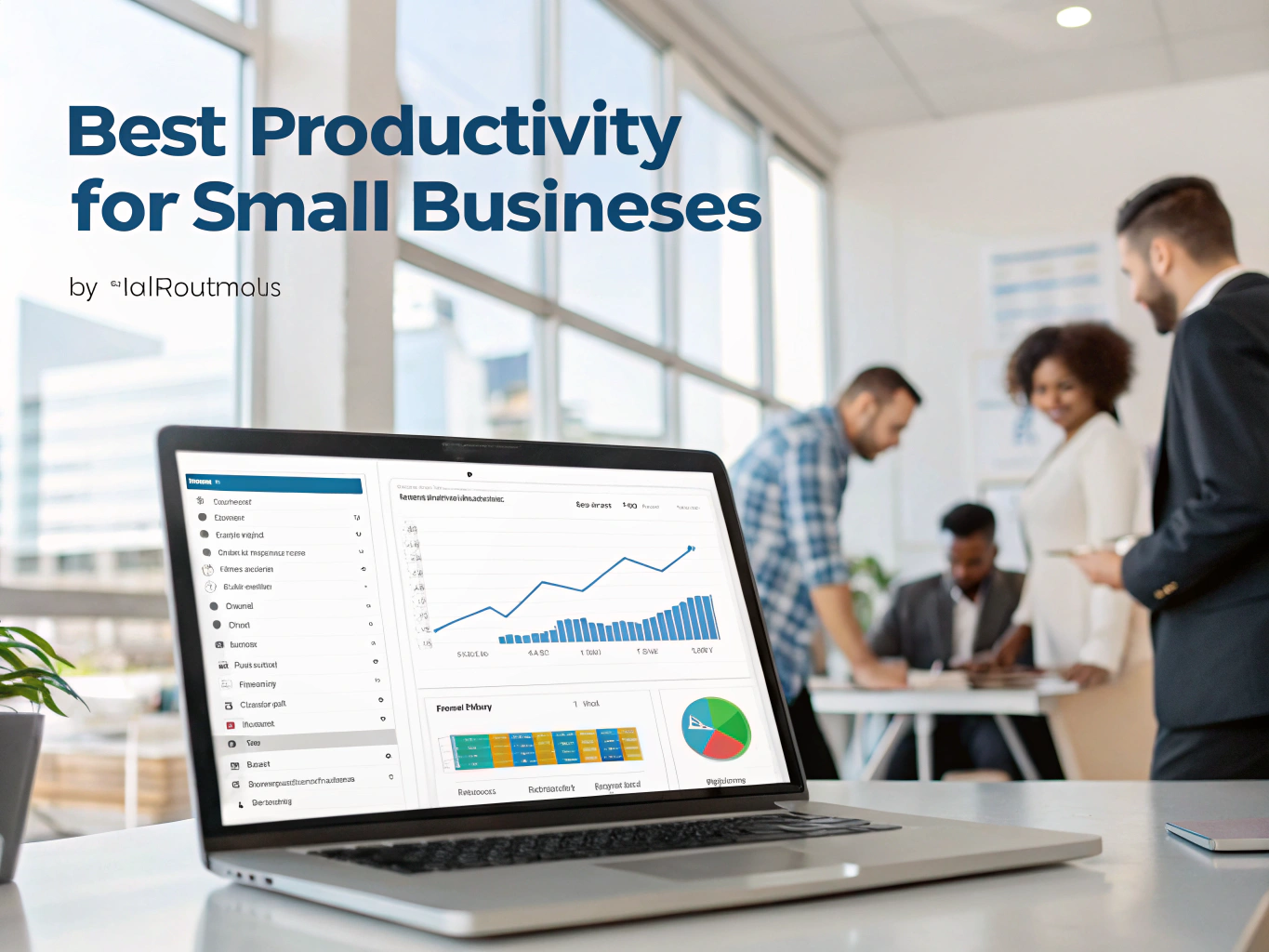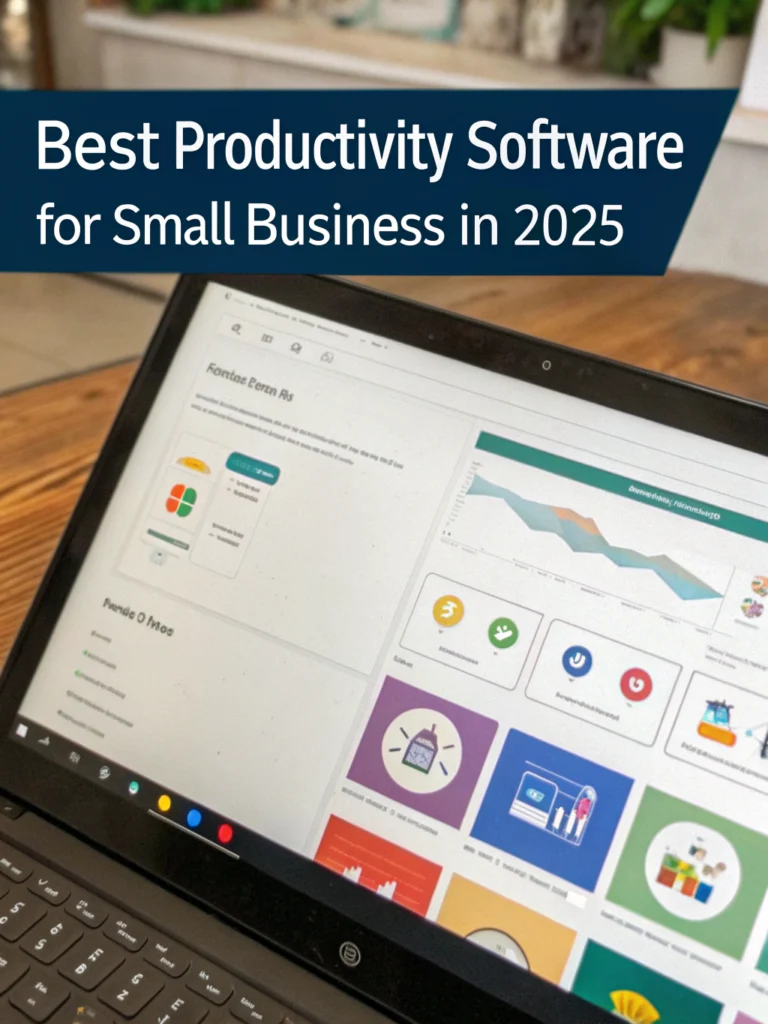Best Productivity Software for Small Business in 2025
Finding the best productivity software for small business needs can feel overwhelming with countless options flooding the market. As a small business owner, your time is precious, and choosing the right tools can be the difference between thriving and merely surviving in today's competitive landscape.
In 2025, productivity software has evolved dramatically, offering unprecedented capabilities to streamline operations, automate mundane tasks, and help entrepreneurs focus on what truly matters – growing their business.
I've spent years working with small businesses to optimize their tech stacks, and I'm excited to share the most effective productivity solutions that will give you an edge this year.
Why Small Businesses Need Specialized Productivity Tools in 2025
Small businesses face unique challenges compared to larger corporations. Limited resources, smaller teams, and tighter budgets mean every minute and dollar counts. The right small business productivity tools don't just save time—they multiply it.
Modern productivity software offers:
- Automation of repetitive tasks
- Improved team collaboration
- Streamlined communication
- Enhanced project management
- Better customer relationship management
- Simplified financial tracking
For entrepreneurs juggling multiple roles, these tools can be lifesavers. The
>AI for Productivity eBook + Checklist: Supercharge Your Efficiency in 2176 offers deep insights into how artificial intelligence is revolutionizing productivity for small businesses.
Top All-in-One Productivity Suites for Small Businesses
When it comes to comprehensive solutions, these all-in-one productivity suites stand out as top business software for small companies in 2025:
1. Microsoft 365 Business
Microsoft continues to dominate with its integrated suite of tools that works seamlessly across devices.
Key features:
- Word, Excel, PowerPoint, and Outlook
- Teams for video conferencing and collaboration
- SharePoint for document management
- OneDrive for secure cloud storage
- Microsoft Planner for task management
- Power Automate for workflow automation
Perfect for: Small businesses already familiar with Microsoft products looking for a comprehensive, integrated solution.
2. Google Workspace
Google's ecosystem offers exceptional collaboration capabilities at competitive pricing.
Key features:
- Gmail for business
- Google Drive for file storage
- Google Docs, Sheets, and Slides
- Google Meet for video conferencing
- Google Chat for team messaging
- Advanced security controls
Perfect for: Teams that need real-time collaboration and businesses with remote workers.
3. Zoho Workplace
Zoho has become a powerhouse for small businesses seeking affordable, feature-rich solutions.
Key features:
- Email hosting
- Document management
- Project management
- Meeting tools
- Social intranet
- Integrated apps for CRM, accounting, and more
Perfect for: Budget-conscious small businesses that want an alternative to Microsoft or Google.

Specialized Productivity Apps for Entrepreneurs in 2025
While all-in-one suites offer convenience, specialized tools can address specific pain points in your workflow:
Project Management Software
In 2025, project management tools have evolved to become more intuitive and AI-driven:
-
ClickUp: The ultimate customizable workspace with over 1,000 integrations and AI-powered features to automate routine tasks.
-
Asana: Known for its intuitive interface and powerful workflow automation, Asana helps teams stay on track with visual project mapping.
-
Monday.com: Highly visual work management platform with customizable templates for virtually any business process.
The right project management tool can transform how your team collaborates. Check out our guide on productivity templates for work success for more insights.
Communication & Collaboration Tools
Effective communication remains the backbone of productivity:
-
Slack: The channel-based messaging platform has added AI features to summarize conversations and suggest responses in 2025.
-
Discord: Originally for gamers, Discord has evolved into a powerful business communication tool with rich media support and high-quality audio/video.
-
Notion: Combines notes, documents, wikis, and project management in one customizable platform. Their 2025 AI assistant makes information retrieval seamless.
For those struggling with focus issues, the
>ADHD Productivity Power Pack: Ebooks, Guides, Checklists, Workbook & Tools to Master Focus, Time Management & Organization provides specialized strategies for maintaining productivity despite attention challenges.
Financial Management Software to Boost Small Business Productivity
Managing finances efficiently is crucial for business health:
-
QuickBooks Online: Remains the gold standard for small business accounting in 2025, with enhanced AI for expense categorization and financial forecasting.
-
FreshBooks: User-friendly accounting software designed specifically for small business owners and freelancers.
-
Wave: Free accounting software with paid add-ons for payment processing and payroll, perfect for very small businesses.
Proper financial management tools not only save time but provide critical insights into your business performance. Learn more about productivity trackers to measure your efficiency.
Customer Relationship Management (CRM)
For many small businesses, customer relationships are everything:
-
HubSpot CRM: The free version offers robust functionality, while paid tiers include marketing automation and sales tools.
-
Zoho CRM: Affordable CRM with AI assistant Zia to help predict sales and identify anomalies.
-
Pipedrive: Sales-focused CRM with an intuitive pipeline view that helps visualize your sales process.
A good CRM not only helps you manage contacts but can substantially increase sales by ensuring no leads fall through the cracks. Explore more about sales productivity tools to maximize your customer relationships.
2025 Productivity Solutions for Startups
Startups have unique needs, often requiring flexibility and scalability:
Time Management & Focus Tools
-
RescueTime: Automatically tracks time spent on applications and websites, helping identify productivity drains.
-
Focus@Will: Uses neuroscience-backed music to improve concentration and focus.
-
Forest: Gamifies focus by growing virtual trees when you stay off your phone.
Automation Tools for Small Teams
-
Zapier: Connect over 5,000 apps to automate workflows without coding knowledge.
-
IFTTT: "If This Then That" creates simple automations between your favorite services.
-
Make (formerly Integromat): Visual automation platform for more complex workflows.
Automation is particularly vital for startups with limited human resources. Our guide on work from home productivity tools offers additional insights for remote teams.
Best Tools for Small Business Owners with Remote Teams
Remote work is now standard for many small businesses:
-
Trello: Visual kanban-style boards for project tracking that are accessible from anywhere.
-
Airtable: Part spreadsheet, part database with a highly visual interface for managing complex projects.
-
Loom: Create quick videos to explain concepts, provide feedback, or walk through processes.
-
Time Doctor: Track time, monitor productivity, and manage payroll for remote teams.
Remote work introduces unique productivity challenges. Check out productivity system for remote teams for specialized strategies.
How to Choose the Right Productivity Software for Your Small Business
With so many options available, selecting the right tools requires careful consideration:
-
Identify Pain Points: What specific processes are slowing your business down?
-
Establish a Budget: Balance functionality with cost-effectiveness.
-
Consider Scalability: Choose tools that can grow with your business.
-
Evaluate Integration Capabilities: Ensure your tools work well together.
-
Test Before Committing: Most solutions offer free trials—use them!
-
Get Team Buy-In: The best software is useless if your team won't adopt it.
Emerging Trends in Small Business Productivity Software for 2025
As we move through 2025, several trends are reshaping productivity solutions:
-
AI Assistants: AI now handles scheduling, email drafting, and even customer service.
-
Voice Commands: Voice-activated productivity tools are becoming mainstream.
-
Augmented Reality Workspaces: AR is beginning to transform how we visualize and interact with data.
-
Hyper-Personalization: Software that adapts to individual work styles and preferences.
-
Wellness Integration: Productivity tools now include features to prevent burnout and encourage healthy work habits.
FAQs About Small Business Productivity Software
What is the most cost-effective productivity suite for a startup?
For startups on a tight budget, Google Workspace offers the best value, with plans starting around $6 per user per month. The free tier of many specialized tools like Trello, HubSpot CRM, and Canva can also form the foundation of a solid productivity stack.
How much time can productivity software really save?
Studies show that implementing the right productivity tools can save small business owners 5-20 hours per week. This varies based on your business type and current inefficiencies, but automation alone typically reduces manual task time by 40-60%.
Is it better to use an all-in-one solution or multiple specialized tools?
This depends on your specific needs. All-in-one solutions offer convenience and simplified management but may not excel in every area. Specialized tools provide superior functionality in their niche but require more integration work. Many businesses use a hybrid approach: a core suite (like Microsoft 365) supplemented with specialized tools for specific needs.
What productivity software offers the best security for small businesses?
Microsoft 365 Business Premium offers enterprise-grade security features specifically designed for small businesses, including advanced threat protection, data loss prevention, and secure cloud storage. For specialized security needs, consider adding tools like LastPass for password management and Malwarebytes for endpoint protection.
How can I ensure my team actually uses the productivity software we purchase?
Start with proper training and demonstrate the direct benefits to individual team members. Choose software with intuitive interfaces and good support resources. Implement new tools gradually rather than overhauling everything at once. Finally, lead by example by actively using the tools yourself.
Conclusion
The best productivity software for small business needs in 2025 combines automation, collaboration, and specialized functionality that addresses your unique challenges. The landscape continues to evolve rapidly, with AI-driven solutions making formerly enterprise-only capabilities accessible to businesses of all sizes.
Remember that productivity tools are meant to serve your business goals, not dictate them. Start with clear objectives, choose solutions that address your specific pain points, and don't be afraid to adjust your tech stack as your business grows.
By strategically implementing the right productivity software, small businesses can level the playing field with larger competitors while maintaining the agility and personal touch that makes them special.
For entrepreneurs looking to maximize their productivity even further, resources like the
>AI for Productivity eBook + Checklist provide cutting-edge strategies to stay ahead in an increasingly competitive business environment.

